-
- June-July 1947
A Banner Year For UFOs, Saucer Crashes & Aerial Sightings
(Some of the material below is carried over from June)
-
Chronological Database Of "Saucer" Crashes July 1947 - More than
40 Incidents
See http://home.fuse.net/ufo/47index.html
-
-
- June 21, 1947 - Pre-Arnold/Pre-Roswell UFO Fleet Encounter
-
- It was approximately 2pm when Harold A. Dahl, the captain
of a coastguard patrol based on Tacoma, Washington, had his amazing UFO
sighting.
-
- Dahl and his crew of U.S. coastguards were patrolling
the southern end of Puget Sound, Washington - a place abundant with islands
and fjords - when they put the launch into an eastern bay off Maury Island,
a small, thinly populated island some three miles from the mainland.
-
- At the time there were two members of Dahl's crew, his
son and a dog on board. As they entered the bay, Dahl looked up from the
wheel and was startled to see "six very large doughnut-shaped machines"
in the air. He judged them to be approximately 2000 feet up, virtually
overhead, stationary and silent.
-
- Intelligent Balloons?
- Initially he thought they were balloons until one decided
to descend, followed by the other five. This lone machine seemed to be
in trouble. Dahl though - although the others closely followed it at a
range of approximately 200 feet above.
-
- It continued on a downwards movement until it was directly
overhead, about 500 feet above the water. They remained totally silent
and Dahl couldn't see any visible means of propulsion - they didn't appear
to have any engines.
-
- Metallic Craft
- Dahl reckoned they were each about 100 feet in diameter
and each had a hole in its center, about 25 feet in diameter. The clouds
were low and thundery, but when the sunlight broke through, Dahl noted
that it reflected from the metallic surfaces of the strange craft. However,
there was not one brilliance, but many.
-
- In addition, the craft appeared to have what appeared
to be 'portholes' equally spaced around the outside of their hulls. Dahl
also reported what looked like dark and circular windows on the inside
and bottoms of them.
-
- Dahl later said, "Fearing that the central and lowermost
machine was going to crash in the bay, we pulled our boat over to the beach
and got out our harbor patrol camera. I took four photos of these balloons,
as I still thought they were. All the time, the five were circling around
the one which was stationery. Five minutes passed, and then one of the
circling machines detached itself from the formation and came right down
to the stationery one. It seemed to touch it, and stayed motionless for
about four minutes.Then we heard a dull thud, and the central craft spewed
out what looked like thousands of newspapers from the inside of its center.
But these falling fragments turned out to be a white type of very light
metal that fluttered to earth, and also fell into the bay. The machine
then seemed to hail on us in the bay, and over the beach, black and darker
type metals, which hit the beach and the bay. All these latter fragments
seemed molten. Steam rose when they hit the water. We ran for shelter under
a cliff and got behind logs. My son's arm was hit by a falling fragment
of metal, and our dog was killed. Then the rain of metal stopped. The strange
craft silently lifted and went westward towards the Pacific. All the time,
the center one remained in the formation. We found the fallen metal too
hot to touch, for some time. But when it cooled, we loaded a large number
of pieces into our launch."
-
- Electrical Malfunctions
- When he climbed back towards the launch, Dahl found that
his radio refused to work.
-
- "When I started out on patrol, my radio had been
in perfect order. But now, the static was so great, I could not make contact
with our shore station! Yet the weather could not have caused all that
interference. Our wheel-house had been hit by the rain of metal, and damaged.
I started up the engines and returned to Tacoma, where my boy had to be
attended in hospital. I reported the adventure to my superior officer,
Mr Fred L. Chrisman; but I could see he did not believe me! I gave him
the camera and the films and also the metal fragments we had collected
in the island. Later, Chrisman went out to the island to look for the 20
tones of metal which I judged had been spewed from the strange machine.
When my films were developed, they showed the strange aircraft, but the
negatives were covered with white spots, as though they had been exposed
to some radiation."
-
- Apparently specimens of the strange metal were taken
to Chicago University for analysis, who described them as "metal that
had fallen from a great height in the sky and landed in sand."
-
- Strange Geology!
- Some skeptics have said that Maury Island is rich in
this type of metal as geological and natural deposits. Further analysis
reported that the metal was an alloy of calcium, iron, zinc, and titanium.
Also present were aluminum, manganese, copper, magnesium, silicon, nickel,
lead, strontium and chromium together with traces of silver, tin and cadmium.
This seems a very remarkable alloy to be found in a natural state all over
Maury Island.
-
- One odd note added, was that the content of calcium was
unusually high and that it had not been oxidized, as it does when heated
- in terrestrial conditions.
-
- Cosmic Protection
- One theory which was put forward at the time was that
the calcium had been cast into the hull of the strange machines to absorb
the lethal cosmic rays out in space beyond our earth's orbit.
-
- Enter the Men in Black
- Not only is this story extremely fascinating, if only
by pre-dating similar events - the metal seems similar to that allegedly
recovered the following month at the Roswell crash site. However, the following
day Dahl was interrogated by what could be one of the first incidents involving
MIB (Men in Black):
-
- According to Dahl, the following morning a strange man
drove to his house and got out of a black Buick car of sedan type. He was
dressed in a dark suit, was around 40 years old and in Dahl's words, looked
like "an insurance agent".
-
- Dahl got out his own car and drove downtown - with the
stranger following him. Why he didn't use the stranger's car for a lift
is not recorded.
-
- Threatening Warnings
- Over breakfast in a hotel, Dahl was asked some curious
'personal' questions;
-
- Stranger: "Are you happy at your job, and in your
family?"
- Dahl: "What the blazes are you getting at?"
-
- At this point, the stranger merely gave a peculiar smile
and proceeded to tell Dahl of the previous events on Maury Island. This
conversation puzzled Dahl as, so far, he had not told anyone about his
experience and there had been no one on the island apart from his crew
- and he did not think they had been talking.
-
- "Mr Dahl," said the stranger, still smiling,
"you had better forget what you have seen, and stop talking. Silence
is the best thing for you and your family. You have seen what you ought
not to have seen!" The stranger then abruptly got up and left the
hotel.
-
- Further Verifications
- Kenneth Arnold later arrived on the scene after being
asked to investigate the strange story. Arnold later interviewed Dahl's
superior officer, Chrisman, who told his own fantastic story:-
-
- Two days after Dahl had reported to me about these strange
machines over Maury Island, I went out in the patrol launch. It was on
the morning of June 23rd. I looked at some of the tons of metal on the
beach. As I did so, one of the strange aircraft suddenly appeared from
nowhere! It circled the bay, banked at an angle of 10 degrees, and shot
up into the center of a cumulus cloud, high in the sky. I have never seen
any aircraft before go into the center of such a cloud. It is very rough
in there. The strange thing looked like a large inner tube to me. It was
not squashed as Dahl had said. It had large portholes round the whole hull,
and its brassy, golden surface seemed burled. I noticed, too, an observation
window in it. When the sun shone on it, it was unusually brilliant. I picked
up a load of the fragments of fallen metal and went back with them in the
launch to Tacoma."
-
- Military Investigations
- Arnold then spoke to Lieutenant Frank Brown of the U.S.
military intelligence, who had also seen the fragments of metal when he
flew over the location in a B.29 bomber.
-
- He sketched, for Arnold, photos that had come to intelligence.
One of the sketches showed a photograph taken some three weeks previously
by Wm. A. Rhodes over Phoenix, Arizona. It showed a strange vessel, looking
like the heel of a shoe, ie. parabolic in shape, with a hole near one of
the curves.
-
- Rhodes had said that there were two tails of vapor trailing
from the edges of the 'heel'. One even more remarkable picture shown to
Arnold looked exactly like Arnold's own (famous) sighting of nine strange
machines flying in formation on June 24th 1947.
-
- The startling thing was that this picture was taken by
a Captain F.W. Banner of the British barque, 'Lady of the Lake', in mid-ocean
off the coast of Liberia on March 22nd, 1870 - 77 years BEFORE Arnold's
sighting.
-
- It looked like a half moon with a tail in it, or like
a half-peak in the center of the disc. The object was flying against the
wind and was visible for half an hour.
-
- This account seems to have all the hallmarks of a classic
sighting; strange metallic craft, fragments of strange metal recovered
and even being followed by a MIB encounter.
- (Source: http://www.cropcircleresearch.com/enigma/issue5/ufo.html
)
-
-
-
-
- June 24, 1947 - Kenneth Arnold's Famous UFO Sighting
-
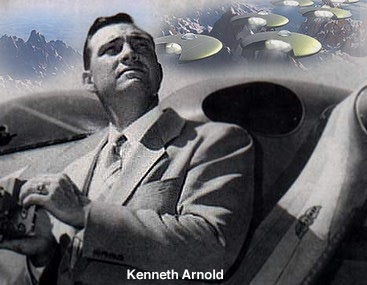 PENDELTON, Ore., June 25 (AP)
-- Nine bright saucer-like objects flying at "incredible speed"
at 10,000 feet altitude were reported here today by Kenneth Arnold, a Boise,
Idaho, pilot who said he could not hazard a guess as to what they were. PENDELTON, Ore., June 25 (AP)
-- Nine bright saucer-like objects flying at "incredible speed"
at 10,000 feet altitude were reported here today by Kenneth Arnold, a Boise,
Idaho, pilot who said he could not hazard a guess as to what they were.
-
- Arnold, a United States Forest Service employee engaged
in searching for a missing plane, said he sighted the mysterious objects
yesterday at 3 P.M. They were flying between Mount Rainier and Mount Adams,
in Washington state, he said, and appeared to weave in and out of formation.
Arnold said he clocked and estimated their speed at 1,200 miles an hour.
[end]
- Note: Arnold estimated the speed of the UFOs at around
1,200 mph, or, at 10,000 feet above sea level, Mach 1.63. The fastest aircraft
in the military at that time topped out at 700 mph. It was not until 1962
that the Lockheed A-12 Blackbird took flight achieving Mach 3.2, at altitudes
of 40,000 ft. or more.
-
- Kenneth Arnold has been credited widely for having coined
the term "Flying Saucer," but in reality, Arnold didn't see saucers.
He described a one-piece, winged "heel" sort of craft, or a crescent
with a domed top, and commented that their movement in the sky was like
saucers "skipping" across water which reporters then drafted
into the lexicon of contemporary lingo.
-
- Nonetheless, what Arnold saw and described was certainly
not conventional aircraft known to any civilians at that time, though we
do know that Nazi Germany was working frantically on craft of similar design and
shape just before the end of the war and may have perfected it, the
knowledge then falling into the hands of the Allies. It is certainly possible
that the US Government/Military had such advanced aircraft as part of blackops
projects in '47, but we simply don't know. One then has to contend with
the myriad of reports of alien pilots found at the Roswell (and other)
crash sites, seen by many eye-witnesses, and the total similarity in the
description of the crashed craft. It would be unlikely that the skies were
being shared by men and extraterrestrials alike in the same kind of ships.
-
-
The Arnold-Roswell-Rhodes Craft Connection
-
- These images, often called "the Roswell craft"
photos, (as it is widely reported that the Roswell craft was not a saucer,
but a "delta" winged craft) appeared in several Southwestern
newspapers around the time of Arnold's sighting and match his basic description
of a heel shaped, domed flyer; These images were photographed the same
day as the Roswell crash which took place in the evening of July 7,
1947, just one state away, in New Mexico.
-

William Rhodes Photos, Phoenix, AZ, July 7, 1947
-
-
-
-
- July 2-8, 1947 - Roswell
-
- There has been so much written about the Roswell crash
and so many sites dedicated to info on Roswell that here we will simply
give a general time-line, a simple chronology of events. It is more than
evident that something did indeed crash of great interest to the US Military
and Government, worthy of a remarkable cover-up, and this included the
retrieval of alien corpses. To accept even a fraction of the official Air
Force explanation of events, one must believe both trained servicemen,
military intelligence officers and civillians alike were so retarded and
addled in 1947 that mere tin foil on a paper backing and kite sticks with
a floral pattern printed on it could produce one of the most profoundly
curious UFO cases of all time, puzzling even the living eyewitnesses to
this very day.
-
-
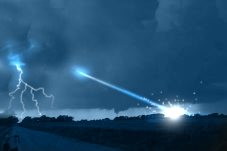
-
-
- On July 2, 1947, during the evening, a flying saucer
crashed on the Foster Ranch near Corona, New Mexico. The crash occurred
during a severe thunderstorm. (The military base nearest the crash site
is in Roswell, New Mexico; hence, Roswell is more closely associated with
this event than Corona, even though Corona is closer to the crash site.)
-
 On July 3, 1947, William "Mac"
Brazel (rhymes with "frazzle") and his 7-year-old neighbor Dee
Proctor found the remains of the crashed flying saucer. Brazel was foreman
of the Foster Ranch. The pieces were spread out over a large area, perhaps
more than half a mile long. When Brazel drove Dee back home, he showed
a piece of the wreckage to Dee's parents, Floyd and Loretta Proctor. They
all agreed the piece was unlike anything they had ever seen. On July 3, 1947, William "Mac"
Brazel (rhymes with "frazzle") and his 7-year-old neighbor Dee
Proctor found the remains of the crashed flying saucer. Brazel was foreman
of the Foster Ranch. The pieces were spread out over a large area, perhaps
more than half a mile long. When Brazel drove Dee back home, he showed
a piece of the wreckage to Dee's parents, Floyd and Loretta Proctor. They
all agreed the piece was unlike anything they had ever seen.
-
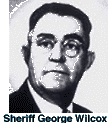 On July 6, 1947, Brazel showed
pieces of the wreckage to Chaves County Sheriff George Wilcox. Wilcox called
Roswell Army Air Field (AAF) and talked to Major Jesse Marcel, the intelligence
officer. Marcel drove to the sheriff's office and inspected the wreckage.
Marcel reported to his commanding officer, Colonel William "Butch"
Blanchard. Blanchard ordered Marcel to get someone from the Counter Intelligence
Corps, and to proceed to the ranch with Brazel, and to collect as much
of the wreckage as they could load into their two vehicles. On July 6, 1947, Brazel showed
pieces of the wreckage to Chaves County Sheriff George Wilcox. Wilcox called
Roswell Army Air Field (AAF) and talked to Major Jesse Marcel, the intelligence
officer. Marcel drove to the sheriff's office and inspected the wreckage.
Marcel reported to his commanding officer, Colonel William "Butch"
Blanchard. Blanchard ordered Marcel to get someone from the Counter Intelligence
Corps, and to proceed to the ranch with Brazel, and to collect as much
of the wreckage as they could load into their two vehicles.
-
- Soon after this, military police arrived at the sheriff's
office, collected the wreckage Brazel had left there, and delivered the
wreckage to Blanchard's office. The wreckage was then flown to Eighth Air
Force headquarters in Fort Worth, and from there to Washington.
-
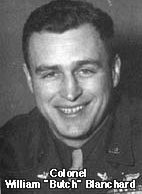 Meanwhile, Marcel and Sheridan
Cavitt of the Counter Intelligence Corps drove to the ranch with Mac Brazel.
They arrived late in the evening. They spent the night in sleeping bags
in a small out-building on the ranch, and in the morning proceeded to the
crash site. Meanwhile, Marcel and Sheridan
Cavitt of the Counter Intelligence Corps drove to the ranch with Mac Brazel.
They arrived late in the evening. They spent the night in sleeping bags
in a small out-building on the ranch, and in the morning proceeded to the
crash site.
-
- On July 7, 1947, Marcel and Cavitt collected wreckage
from the crash site. After filling Cavitt's vehicle with wreckage, Marcel
told Cavitt to go on ahead, that Marcel would collect more wreckage, and
they would meet later back at Roswell AAF. Marcel filled his vehicle with
wreckage. On the way back to the air field, Marcel stopped at home to show
his wife and son the strange material he had found.
-
- On July 7, 1947, around 4:00 pm, Lydia Sleppy at Roswell
radio station KSWS began transmitting a story on the teletype machine regarding
a crashed flying saucer out on the Foster Ranch. Transmission was interrupted,
seemingly by the FBI.
-
- On July 8, 1947, in the morning, Marcel and Cavitt arrived
back at Roswell AAF with two carloads of wreckage. Marcel accompanied this
wreckage, or most it, on a flight to Fort Worth AAF.
-
- On July 8, 1947, around noon, Colonel Blanchard at Roswell
AAF ordered Second Lieutenant Walter Haut to issue a press release telling
the country that the Army had found the remains of a crashed a flying saucer.
Haut was the public information officer for the 509th Bomb Group at Roswell
AAF. Haut delivered the press release to Frank Joyce at radio station KGFL.
Joyce waited long enough for Haut to return to the base, then called Haut
there to confirm the story. Joyce then sent the story on the Western Union
wire to the United Press bureau.
-
-
- On July 8, 1947, in the afternoon, General Clemence McMullen
in Washington spoke by telephone with Colonel (later Brigadier General)
Thomas DuBose in Fort Worth, chief of staff to Eighth Air Force Commander
General Roger Ramey. McMullen ordered DuBose to tell Ramey to quash the
flying saucer story by creating a cover story, and to send some of the
crash material immediately to Washington.
-
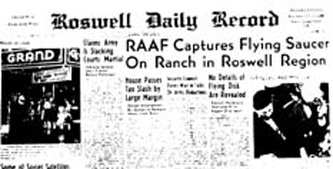
-
-
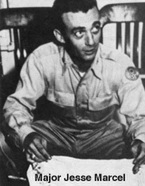 On July 8, 1947, in the afternoon,
General Roger Ramey held a press conference at Eighth Air Force headquarters
in Fort Worth in which he announced that what had crashed at Corona was
a weather balloon, not a flying saucer. To make this story convincing,
he showed the press the remains of a damaged weather balloon that he claimed
was the actual wreckage from the crash site. (Apparently, the obliging
press did not ask why the Army hurriedly transported weather balloon wreckage
to Fort Worth, Texas, site of the press conference, from the crash site
in a remote area of New Mexico.) On July 8, 1947, in the afternoon,
General Roger Ramey held a press conference at Eighth Air Force headquarters
in Fort Worth in which he announced that what had crashed at Corona was
a weather balloon, not a flying saucer. To make this story convincing,
he showed the press the remains of a damaged weather balloon that he claimed
was the actual wreckage from the crash site. (Apparently, the obliging
press did not ask why the Army hurriedly transported weather balloon wreckage
to Fort Worth, Texas, site of the press conference, from the crash site
in a remote area of New Mexico.)
-
- The only newspapers that carried the initial flying saucer
version of the story were evening papers from the Midwest to the West,
including the Chicago Daily News, the Los Angeles Herald Express, the San
Francisco Examiner, and the Roswell Daily Record. The New York Times, the
Washington Post, and the Chicago Tribune were morning papers and so carried
only the cover-up story the next morning.
-
- At some point, a large group of soldiers were sent to
the debris field on the Foster Ranch, including a lot of MPs whose job
was to limit access to the field. A wide search was launched well beyond
the limits of the debris field. Within a day or two, a few miles from the
debris field, the main body of the flying saucer was found, and a mile
or two from that several bodies of small humanoids were found.
-
- The military took Mac Brazel into custody for about a
week, during which time he was seen on the streets of Roswell with a military
escort. His behavior aroused the curiosity of friends when he passed them
without any sign of recognition. Following this period of detention, Brazel
repudiated his initial story.
-
-
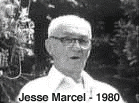 [Major Jesse Marcel was one of
the the first two military people to visit the Corona crash site. The other
was Sheridan Cavitt, who to this day has refused to even acknowledge that
he was there on the ranch with Marcel. Jesse Marcel died in 1982. He was
interviewed in 1979.] [Major Jesse Marcel was one of
the the first two military people to visit the Corona crash site. The other
was Sheridan Cavitt, who to this day has refused to even acknowledge that
he was there on the ranch with Marcel. Jesse Marcel died in 1982. He was
interviewed in 1979.]
-
- When we arrived at the crash site, it was amazing to
see the vast amount of area it covered. It was nothing that hit the ground
or exploded [on] the ground. It's something that must have exploded above
ground, traveling perhaps at a high rate of speed, we don't know. But it
scattered over an area of about three quarters of a mile long, I would
say, and fairly wide, several hundred feet wide. So we proceeded to pick
up all the fragments we could find and load up our Jeep Carry-All. It was
quite obvious to me, familiar with air activities, that it was not a weather
balloon, nor was it an airplane or a missile. What it was, we didn't know.
We just picked up the fragments. It was something I had never seen before,
and I was pretty familiar with all air activities. We loaded up the Carry-All
but I wasn't satisfied. I told Cavitt, "You drive this vehicle back
to the base and I'll go back out there and pick up as much as I can put
in the car,", which I did. But we picked up only a very small portion
of the material that was there.
-
- One thing that impressed me about the debris that we
were referring to is the fact that a lot of it looked like parchment. A
lot of it had a lot of little members [I-beams] with symbols that we had
to call them hieroglyphics because I could not interpret them, they could
not be read, they were just symbols, something that meant something and
they were not all the same. The members that this was painted on -- by
the way, those symbols were pink and purple, lavender was actually what
it was. And so these little members could not be broken, could not be burned.
I even tried to burn that. It would not burn. The same with the parchment
we had.
-
- But something that is more astounding is that the piece
of metal that we brought back was so thin, just like the tinfoil in a pack
of cigarette paper. I didn't pay too much attention to that at first, until
one of the GIs came to me and said, "You know the metal that was in
there? I tried to bend that stuff and it won't bend. I even tried it with
a sledge hammer. You can't make a dent on it."
-
- I didn't go back to look at it myself again, because
we were busy in the office and I had quite a bit of work to do. I am quite
sure that this young fellow would not have lied to me about that, because
he was a very truthful, very honest guy, so I accepted his word for that.
So, beyond that, I didn't actually see him hit the matter with a sledge
hammer, but he said, "It's definite that it cannot be bent and it's
so light that it doesn't weigh anything." And that was true of all
the material that was brought up. It was so light that it weighed practically
nothing.
-
- This particular piece of metal was, I would say, about
two feet long and perhaps a foot wide. See, that stuff weighs nothing,
it's so thin, it isn't any thicker than the tinfoil in a pack of cigarettes.
So I tried to bend the stuff, it wouldn't bend. We even tried making a
dent in it with a 16-pound sledge hammer, and there was still no dent in
it. I didn't have the time to go out there and find out more about it,
because I had so much other work to do that I just let it go. It's still
a mystery to me as to what the whole thing was. Like I said before, I knew
quite a bit about the material used in the air, but it was nothing I had
seen before. And as of now, I still don't know what it was. So that's how
it stands.
-
- [Here is what Jesse Marcel said on the American television
program "Unsolved Mysteries".]
-
- There were just fragments strewn all over the area, an
area about three quarters of a mile long and several hundred feet wide.
So we proceeded to pick up the parts.
-
- I tried to bend the stuff, it would not bend. I even
tried to burn it, it would not burn. That stuff weighs nothing. It's not
any thicker than tin foil in a pack of cigarettes. We even tried making
a dent in it with a 16-pound sledge hammer, still no dent in it.
-
- One thing I was certain of, being familiar with all our
activities, that it was not a weather balloon, nor an aircraft, nor a missile.
It was something else, which we didn't know what it was.
-
-
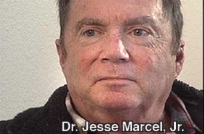 [Dr.
Jesse Marcel Jr is Major Jesse Marcel's son. When Major Marcel returned
from the Foster Ranch with a carload of wreckage from the crashed flying
saucer, he stopped off at home to show his wife and his eleven-year old
son what he had found. Jesse Jr is now a medical doctor, an Army reserve
helicopter pilot who served in Vietnam, and a qualified aircraft accident
investigator.] [Dr.
Jesse Marcel Jr is Major Jesse Marcel's son. When Major Marcel returned
from the Foster Ranch with a carload of wreckage from the crashed flying
saucer, he stopped off at home to show his wife and his eleven-year old
son what he had found. Jesse Jr is now a medical doctor, an Army reserve
helicopter pilot who served in Vietnam, and a qualified aircraft accident
investigator.]
-
- The crash and remnants of the device that I happened
to see have left an imprint on my memory that can never be forgotten. The
craft was not conventional in any sense of the word, in that the remains
were most likely what was then known as a flying saucer that had apparently
been stressed beyond its designed capabilities.
-
- I'm basing this on the fact that many of the remnants,
including I-beam pieces that were present, had strange hieroglyphic typewriting
symbols across the inner surfaces, pink and purple, except that I don't
think there were any animal figures present as there are in true Egyptian
hieroglyphics.
-
- The remainder of the debris was just described as nondescript
metallic debris, or just shredded fragments, but there was a fair amount
of the intact I-beam members present. I only saw a small portion of the
debris that was actually present at the crash site.
-
- [Here is what Jesse Marcel Jr said on the American television
program "Unsolved Mysteries".]
-
- When [Dad] came back to the house he had a bunch of wreckage
with him at the time, and he brought the wreckage into the house. Actually
wakened my mother and myself out so we could view this, because it was
so unusual. This was about two o'clock in the morning as I recall, and
he spread it out so we could get some basic idea what it looked like, what
it was....
-
- We were all amazed by this debris that was there, primarily
because we didn't know what it was, you know, it was just the unknown....
-
- This writing [on a short piece of I-beam] could be described
as like hieroglyphics, Egyptian-type hieroglyphics, but not really. The
symbols that were on the I-beams were more of a geometric-type configuration
in various designs. It had a violet-purple type color and was actually
an embossed part of the metal itself.
-
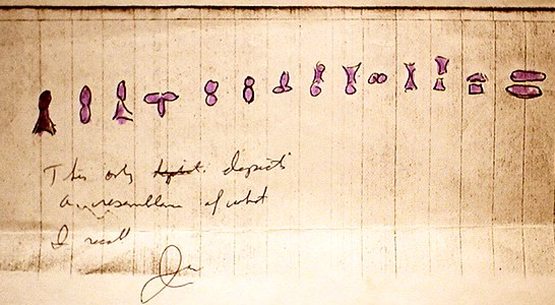
-
- Years after this incident happened, we would talk privately
among ourselves about what the possibilities of this, what this thing was.
And I feel that we, well I know that we came to the conclusion it was not
of earthly origin.
-
- If I had not actually held pieces of it in my hand, I
would not think that it would be possible. But because I happened to see
this, that's the only reason I believe it....
-
- My dad said obviously it [the weather balloon story]
was a cover-up story, it was not a weather balloon. He was a little disturbed
about that, but he had his own security classification to protect. He could
not really go public with, 'hey this is not the real thing', I mean this
is not a weather balloon. So he had to keep that to himself.
-
- (Source: http://mega.ist.utl.pt/~rmlbgs/Roswell.ufo
- Most of the testimony in this document is from the 1992 book "Crash
at Corona" by Stanton Friedman and Don Berliner, published in the
United States by Paragon House.)
-
-
-
-
- July 13-29, 1952 - Washington D.C. Scene Of Full-Force
Alien Invasion!
-
- National Airlines plane en route to National Airport,
about 60 mi. SW of the city observed a blue- white ball of light hovering
to the west. Object then "came up to 11,000 ft. and then maintained
a parallel course, on the same level, at the same speed, until the aircraft
pilot turned on all lights. Object then departed from the vicinity at an
estimated 1000 mph. Weather was excellent for observation." The crew
said the object "took off up and away." No other air traffic
was reported in the area at the time.
-
-
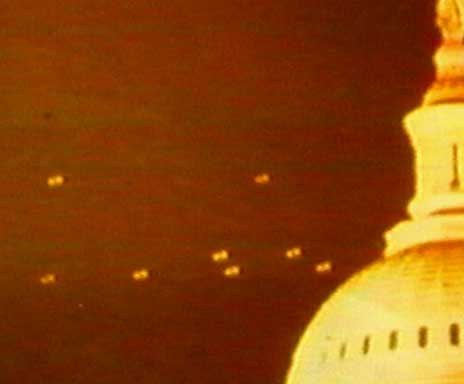
-
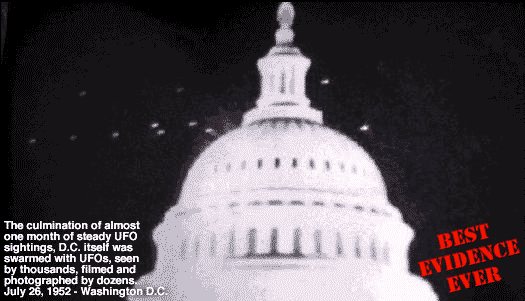
-
-
-
- July 14. Newport News, Virginia: Southbound Pan American
Airways plane at 8,000 ft. nearing the Norfolk, Virginia., area observed
six glowing red, circular objects approaching below the airliner; objects
flipped up on edge in unison and then sped from behind and under the airliner
and joined the in-line formation, which "climbed in a graceful arc
above the altitude of the airliner." "Then the lights blinked
out one by one, though not in sequence." Next day the crew was thoroughly
interrogated and advised that they already had seven other reports of red
discs moving at high speed and making sharp turns.
-
- July 16. Hampton Roads, Virginia: A Government aeronautical
research engineer observed two amber-colored lights approaching from the
south at about 500 m.p.h. These slowed and made a U-turn, revolved around
each other at a high rate of speed, then joined by two other objects from
different directions, the four sped off to the south at about 500 m.p.h.
"They moved jerkily when moving slowly. Their ability to make tight
circling turns was amazing."
-
- July 18. Washington, D. C. Radio station chief engineer
observed 6-7 bright orange discs moving in single file. Each in turn veered
sharply upward and disappeared.
-
- July 19. National Airport began picking up unidentified
targets on radar.
-
- July 20. Herndon, Va. Capital Airlines flight from National
Airport called by control tower to check on unidentified radar targets
saw three objects, and three more between there and Martinsburg, W. Va.
"like falling stars without tails [which] moved rapidly up, down,
and horizontally. Also hovered." Chief CAA air traffic controller
Harry Barnes later said in a newspaper interview: "His [the pilot's]
subsequent description of the movement of the objects coincided with the
position of our pips [radar targets] at all times while in our range.
-
-
- Diagram of July 20, 1952 UFOs Over DC
| Diagram of the UFOs tracked by Washington's National Airport
radar scope on July 20, 1952. At A, 7 objects approach the Nation's
capital from the south. At B, some are seen over the White House
and Capitol. At C, they appear over Andrews Air Force Base. At D,
one UFO tracks an airliner. At E, one is seen to make a sharp right-angular
turn. Source: UFOs - A Pictorial History From Antiquity to the Present,
by David C. Knight. (McGraw Hill Book Co., 1979.) Source: Chez |
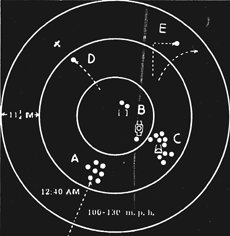 |
-
-
- July 20. Andrews AFB, Maryland, (Nr. Washington, D.C.).
Five witnesses visually observed three reddish-orange objects moving erratically.
-
- July 20. Capital Airlines flight incoming to National
Airport reported that an unidentified light followed his airliner from
the vicinity of Herndon, Virginia, to within about 4 miles west of the
airport, confirmed on radar.
-
- July 20. Additional unidentified targets appear on radar
at National Airport.
-
- July 20. Air Force radar operators at Andrews AFB weather
tower tracked 10 UFOs for 15-20 minutes. Objects approached runway, scattered,
made sharp turns and reversals of direction.
-
- July 26. Sharp UFO targets on radar at National Airport.
Civilian pilots saw glowing white objects on four occasions, including
a United Airlines pilot near Herndon, Va., and two CAA pilots over Maryland.
National Airlines pilot near Andrews AFB at 1700 ft. saw a UFO "flying
directly over the airliner."
-
- July 26. Radar at National airport tracked a UFO on radar
("big target"), confirmed by Andrews AFB radar.
-
- July 26. Radar at National Airport tracked "solid
returns" of "four targets in rough line abreast," and eight
others scattered over the radarscope.
-
- July 26. Andrews AFB, Md., surveillance radar tracked
10-12 UFOs in Washington, D.C. area.
-
- July 26. National Airport, 10-12 objects on radar.
-
- July 26. "Good sharp targets" of 4-8 UFOs on
ARTC radar at National Airport.
-
- July 26. Air Force Command Post notified of unidentified
radar targets. Two F-94 jet interceptors scrambled from New Castle AFB,
Delaware, to investigate.
-
- July 27. Major Fournet, (Project Blue Book Officer in
Pentagon), and Lt. Holcomb, (Navy electronics expert), arrived at National
Airport Center. Observed "7 good, solid targets." Holcomb checked
on temperature inversions, but they were minor and could not explain what
was going on. He so advised AF Command Post, requesting interception mission.
By the time the F-94 jets arrived from Delaware, no strong unidentified
targets remained and no visual contacts were made.
-
- July 27. F-94 jet interceptors scrambled from New Castle
AFB, Del., to investigate Washington, D.C., radar- UFOs. One F-94 pilot
made visual contact and appeared to be gaining on target; both F-94 and
UFO were observed on radar and "appeared to be traveling at the same
approximate speed." When the F-94 pilot tried to overtake the UFO,
it disappeared visually and on radar. The pilot remarked about the "incredible
speed of the object."
-
|